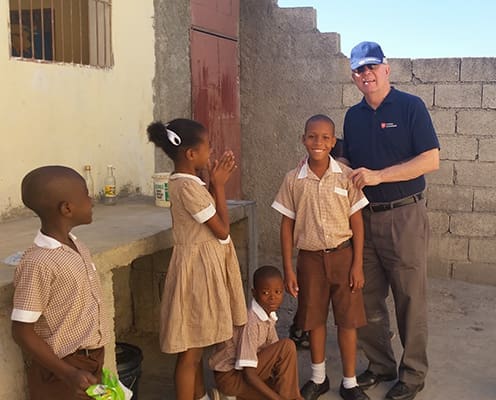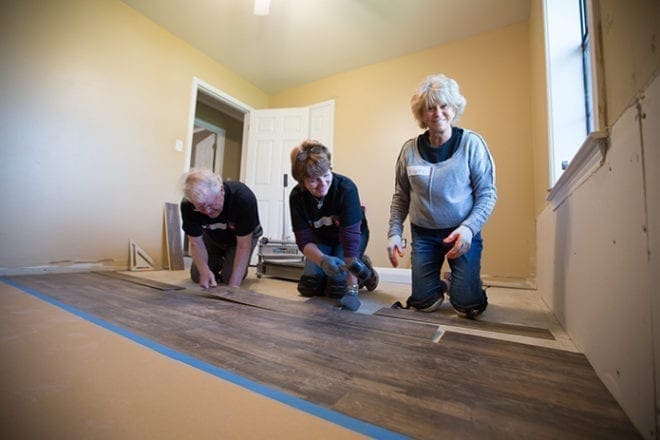Atlanta
Atlantan Wessels lives the faith by leading Malteser relief efforts
By PRISCILLA GREEAR, Special to the Bulletin | Published June 11, 2018
ATLANTA—In the U.S. Army Reserve, Maj. Gen. Thomas Wessels engaged in missions across the Middle East and Southeast Asia from Bahrain to Saudi Arabia. Now retired after 37 years of military service and a 43-year banking career, he travels from Haiti’s slums to Colombian jungles to lead a new strategic mission: to uplift the hemisphere’s forgotten sick and poor.
As president of Malteser International Americas, he also hopes to bring Catholics on board with the mission.

Volunteer leader Tom Wessels spends time with schoolchildren in Haiti where new latrines were built as part of the Malteser International Americas water, sanitation and hygiene program. Wessels, a resident of Atlanta, was elected president of the organization, which cares for the sick and the poor around the world, in 2017. Courtesy of Malteser International Americas
Wessels carries onward an ancient tradition started by the Order of Malta, a Catholic religious lay and chivalrous order established in 1099 in Jerusalem during the Crusades to defend Christianity and care for the wounded, poor and sick. It is now headquartered at the foot of Rome’s Spanish Steps. Building on that humanitarian tradition, its relief agency Malteser International was established in Germany after World War II and began serving the Americas in 2010 following Haiti’s earthquake and cholera outbreak. Just this year, volunteer leader Wessels has travelled for site visits to Dominican Republic and Colombia, a general assembly in Budapest and a board meeting in Haiti’s Cité Soleil and Tabarre slums outside Port-au-Prince.
Reaching families facing poverty, disease and disaster through volunteers and staff in partnership with local organizations and governments, Malteser International Americas is also conducting health projects in Lima, Peru; Mexico City; and assessments in Puerto Rico.
A member of Holy Spirit Church, Atlanta, Wessels became a Knight of the Order of Malta in 2008 and president of Malteser International Americas in 2017.
“I’m able to walk my faith by doing things for us that are important as Catholics because it’s providing humanitarian assistance, disaster relief and then eventually sustainable development,” said Wessels, who is 74. “We’re basically trying to bring dignity to everybody, respect and understanding and love for all the people we help. It doesn’t matter what their religion is, we treat everybody as equals.”
Projects in Haiti change lives
Malteser’s vice president, Ed Delaney, of Boston, was impressed in Haiti by the scope of projects such as planting mangroves on the shoreline to purify the water, prevent erosion, attract shellfish and counter deforestation. And the plant and animal protein food security program provides families with chickens, ducks and pigs and gardens.
“These are long-term, sustainable programs that will really change lives not just today but for long term,” said Delaney, a retired software entrepreneur. “It’s simple concepts like clean water, sanitation, food security, having chickens and pigs. Those things make sense but you have to actually do it. So that’s what is exciting about Malteser.”
Now Wessels seeks to engage people of faith interested in humanitarian work.
“My main mission is to let the Catholic world know and then the rest of society know that we are a worldwide, respected charitable disaster response organization,” said Wessels, who recently appeared on EWTN Live. “We’re there in 120 countries around the world diplomatically and we’re engaged with about 27 countries with our works … About 90 percent of every dollar raised goes to the works of the order, so it’s very, very efficient worldwide.”
The nonprofit is finalizing a memorandum of understanding with the U.S. Agency for International Development and completing accreditation with the National Association of Voluntary Organizations Active in Disasters, enabling them to partner with FEMA as a first responder in disasters and develop an American volunteer organization.
In Europe “they have a huge volunteer force of thousands and thousands of people who’d like to support Malta and Malteser International. And I’d love to see that happen in the U.S.,” he said.
Wessels oversaw relocation in 2017 of the Americas headquarters from Miami to New York City in the Archdiocese of New York’s building. The move enables more engagement with international humanitarian partners and the United Nations, where they have consultative status on the Economic and Social Council.

Malteser International Americas, an organization started by the Order of Malta, a Catholic religious lay and chivalrous order established in 1099, serves the Americas with concentrated relief efforts. Tom Wessels, the president of the international group who is also from Atlanta, left, works on laying flooring with other Order of Malta members during a home rehabilitation project following the floods in Lafayette, La. Courtesy of Malteser International Americas
“That’s where Malteser is engaged, around the world,” he said.
“Go where others won’t go”
Wessels’ office in Atlanta is about the average home size of families they serve in Haiti and Colombia. The homes typically have metal or wood siding, dirt floor and no running water or electricity.
“We are an order of relief, and we go where others won’t go. We’re working in the slums of Haiti cleaning sewage from the streets and trying to get them clean water,” said Wessels.
They are also improving sanitation around Cité Soleil where Haitians lack even toilet facilities. In schools, they built latrines with water faucets.
“The kids show that they actually go in the latrines, but at the same time you look over there and there’s someone squatting, going in a hole in the schoolyard at the school. So it’s a cultural thing. We’ve got a lot to do. We call it WASH—water, sanitation and hygiene—that we need to continue to build on particularly in those slums of Haiti but also a little bit in Mexico and Colombia.”
At Belle-Anse, on Haiti’s southern coast, volunteers have constructed an aqueduct.
“Our job, frankly, is to go in and work alongside them so that they can build up their local capacities and get them to employ locals who understand the challenges of that particular area and let people grow their own food, be able to fish where they haven’t fished before,” said Wessels.
Supporting farmers in Colombia
At Northern Colombia’s headquarters in the city of Santa Marta, Malteser established health and nutrition initiatives to support rural indigenous populations hurt by displacement and malnourishment. Among several projects, Malteser is introducing more diverse crops for farming in lush flood-prone communities.
“Those techniques are being introduced to the farmers, and they are very excited about it. They have a whole variety of plants all being planted right next to each other and that sustains the soil and prevents erosion of the soil during hurricanes,” Delaney said. Furthermore, “bee populations have been devastated by disease around the world but it’s particularly acute in Central and South America so we work with a local university in Colombia to introduce a strain of bees resistant to disease.”
Northeast of Santa Marta, Malteser works in the desert region of La Guajira, near Venezuela. They built a concrete facility for use as a health clinic once equipment is attained for doctors on staff as part of a larger primary heath initiative to rehabilitate and equip 20 health centers and train 40 healthcare workers and midwives. With a regional scarcity of clean water and nutritious food, they provide a water filtration system and “manna packs” of nutrient-fortified rice for children. Delaney believes that Malteser can make a profound impact in Colombia as a country in transition to greater stability. But its latest challenge is the million Venezuelan refugees who have poured in.
“Pope Francis has asked us to pay particular attention to refugees and migration. This is a real tangible opportunity to do that, and one of the charisms of the Order of Malta is that we are a people of action—our spirituality is rooted in action. For me it’s just not talking about it but doing stuff, really tangibly changing people’s lives and that’s very fulfilling for me both as a human being and as a Catholic,” he said.
And Wessels has set the bar high.
“He’s a great leader. He’s motivational, he’s been very successful in hitting all of our targets and meeting all of our goals while he’s been president. He brings an energy and a passion for the projects and for the works of Malteser,” Delaney added.
Catholics are encouraged to support the efforts, whether by sharing Malteser’s good work with friends and joining their social media network or raising money and creating awareness campaigns in their parish.
And Wessels gladly leads the way, applying his financial acumen and “mission first” military leadership.
“In the Crusades defending the faith meant fighting the Muslims. But now it means defend your faith, know your faith, act your faith, live your faith, so we participate in programs to do that and take care of the sick and the poor,” he said. “So if I’m able to do all that and spread the word, spread the branding, hopefully I’m doing some good.”
As a reminder of the labors, he keeps a banana leaf vase in his living room presented to him by a family in Colombia.
“These are people who live in abject poverty. They bathe in the river, go to bathroom where they can go. Hopefully they can get a regular supply of water. We have rebuilt a couple of the homes in those communities; they are actually concrete,” Wessels said. “They need assistance to live a life with dignity. We need to help those families in crisis in all the different countries we’re in.”
For information visit www.orderofmaltarelief.org.